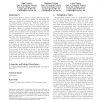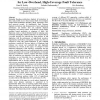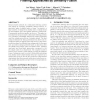1515 search results - page 118 / 303 » Prediction without markets |
COGSCI
2002
13 years 8 months ago
2002
We address the problem of predicting how people will spontaneously divide into groups a set of novel items. This is a process akin to perceptual organization. We therefore employ ...
AAAI
2012
11 years 11 months ago
2012
Peer prediction mechanisms allow the truthful elicitation of private signals (e.g., experiences, or opinions) in regard to a true world state when this ground truth is unobservabl...
SIGIR
2009
ACM
14 years 3 months ago
2009
ACM
Recommender Systems, based on collaborative filtering (CF), aim to accurately predict user tastes, by minimising the mean error achieved on hidden test sets of user ratings, afte...
ASPLOS
2006
ACM
14 years 3 months ago
2006
ACM
Redundant threading architectures duplicate all instructions to detect and possibly recover from transient faults. Several lighter weight Partial Redundant Threading (PRT) archite...
SIGIR
2006
ACM
14 years 3 months ago
2006
ACM
Memory-based methods for collaborative filtering predict new ratings by averaging (weighted) ratings between, respectively, pairs of similar users or items. In practice, a large ...



